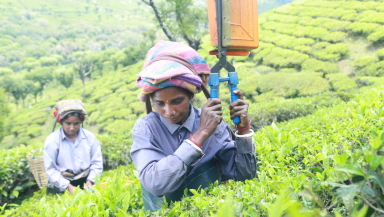
The Fairtrade Foundation has unveiled a new campaign calling on the UK government, businesses, and everyday tea drinkers to take action in support of tea producers worldwide.
The Brew it Fair launched this week on the same day as International Tea Day.
It is calling for action to be taken to ensure that the people behind the UK’s 100 million daily cups of tea are paid fairly and treated with dignity.
The campaign coincides with the release of a major new Fairtrade report, ‘Brew it Fair: Creating a Fairer Future for the People Behind the Tea we Drink,’ highlighting persistent inequities in the global tea trade.
Despite three decades of advocacy, only a fraction of tea sold in the UK is certified Fairtrade, and the vast majority of profits still fail to reach those who grow, pick and process the tea.
According to the report, while UK consumers have grown accustomed to paying very little for tea, the people who grow it receive even less.
A minimal portion of the price paid in supermarkets actually reaches tea producers, with the average tea bag costing just 2 to 3 pence.
The report also highlights how the global tea market is dominated by auctions, where a handful of powerful buyers use their influence to drive down prices, leaving farmers with little control and inadequate compensation.
Kenyan tea farmers - who produce nearly half the tea drunk in the UK - are among the hardest hit.
A March survey of over 250 Kenyan tea producers revealed that only 1 in 5 can afford basic needs like food, education and housing.
Climate change is exacerbating their challenges, with optimal tea-growing areas in Kenya predicted to shrink by 25 per cent by 2050.
The Brew it Fair campaign is urging the UK government to introduce a new law mandating human rights and environmental due diligence (HREDD) in business supply chains, protecting overseas workers from abuse without shifting the burden of compliance onto them.
The Fairtrade Foundation wants to see the UK government to work with businesses to reform and stabilise the tea supply chain through shared responsibility.
It is also asking the government to fulfil the UK’s climate finance promises, ensuring that producers affected by climate change, especially in tea-producing nations like Kenya, receive the support they need to adapt.
“The UK accounts for 61 per cent of all the Fairtrade tea sold in the world, and Fairtrade tea producers have earned more than £50 million in Fairtrade Premium through sales of Fairtrade tea in the UK over the last 30 years: critical investment for building more resilient farms and communities,” said the CEO of Fairtrade Foundation, Eleanor Harrison, adding that with just 4% of Fairtrade-eligible tea currently sold under Fairtrade terms, greater scale and stronger laws that uphold human rights and protect the environment are essential to achieving lasting, systemic change in the sector.
Despite the difficulties, Fairtrade initiatives have provided hope.
At Kenya’s Gacharage Tea Factory, which supports 5,000 farmers, Fairtrade premiums have been invested in income diversification projects such as avocado and dairy farming, and scholarships for local students.
“The future looks bright for these young and brilliant Kenyans,” said tea farmer and Gacharage Premium Committee member, Jacky Wangari.
“We have about nine students enjoying full scholarships through Fairtrade funds … [with] two of them working; one is a teacher and the other one is doing a business in town. If Fairtrade was not there, these bright students in need would not have joined campus.”
Among the major UK brands already on board are Marks & Spencer, Ringtons, Clipper, Co-op, Sainsbury’s, Waitrose and Greggs.
Rwandan choreographer and Fairtrade Foundation partner Sherrie Silver is helping spread the message: “Being based in Rwanda – a major tea-producing country – I have seen firsthand how tea can change lives through employment, women’s empowerment and improving the quality of life for people in farming communities.
“Fairtrade is such an important cause as it ensures people around the world receive better prices, decent working conditions and a fairer deal for all.”
Ms Harrison stressed the urgent need for reform: “The people growing our tea deserve to be able to live with dignity. That means earning a decent income, working in safe conditions, and having the ability to support their families and send their children to school.
“We all have a role to play in making that happen: from the UK government introducing a new law to help prevent abuses in tea supply chains; to businesses taking a lead on responsibility; and to all of us as tea lovers in the choices we make when we buy our tea in the supermarket.”













